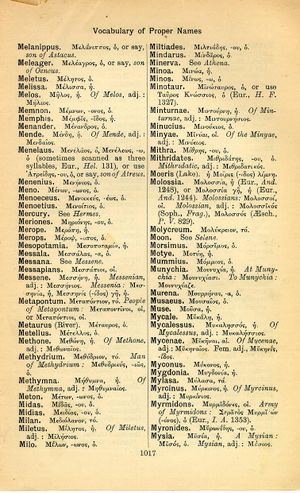Meleager: Difference between revisions
ἐπὶ ξυροῦ γὰρ ἀκμῆς ἔχεται ἡμῖν τὰ πρήγματα → our affairs are balanced on a razor's edge, our affairs are set upon the razor's edge
m (Text replacement - "}}]]" to "}}]]") |
m (Text replacement - "(|thumb)\n(\|link=)" to "$1$2") |
||
| Line 1: | Line 1: | ||
{{WoodhouseENELnames | {{WoodhouseENELnames | ||
|Text=[[File:woodhouse_1017.jpg|thumb | |Text=[[File:woodhouse_1017.jpg|thumb|link={{filepath:woodhouse_1017.jpg}}]]Μελέαγρος, ὁ, or say, <b class="b2">son of Oeneus.</b> | ||
|link={{filepath:woodhouse_1017.jpg}}]]Μελέαγρος, ὁ, or say, <b class="b2">son of Oeneus.</b> | |||
}} | }} | ||
{{Lewis | {{Lewis | ||
Revision as of 16:50, 18 May 2020
English > Greek (Woodhouse)
Μελέαγρος, ὁ, or say, son of Oeneus.
Latin > English (Lewis & Short)
Mĕlĕăger: and Mĕlĕăgros (-ag-rus), gri, m., = Μελέαγρος,
I son of the Calydonian king Œneus and Althæa, one of the combatants at the Calydonian boar-hunt. His life depended on the preservation of an extinguished brand; this his mother burned, out of revenge for the death of her brothers who had fallen by his hand, and he expired, Ov. M. 8, 299 sq.; id. H. 9, 151; Val. Fl. 1, 435; Hyg. Fab. 171 sq.; Serv. Verg. A. 7, 306.—Hence,
A Mĕlĕāgrēus, a, um, adj., of or belonging to Meleager, Luc. 6, 365.—
B Mĕlĕāgrĭdes, um, f.
1 The sisters of Meleager, who, according to the fable, bitterly lamented his death, and were changed into birds called after his name, Hyg. Fab. 174; Ov. M. 8, 534 sq.—
2 A kind of fowls, Guinea-hens, the same as Gallinae Africanae, or a variety of them, Varr. R. R. 3, 9, 18; Plin. 10, 26, 38, § 74.—
C Mĕlĕāgrĭus, a, um, adj., = Μελεάγριος, of or belonging to Meleager, Meleagrian, Stat. Th. 4, 103.
Latin > French (Gaffiot 2016)
Mĕlĕăgĕr¹¹ et -grus ou -grŏs, ī, m. (Μελέαγρος), Méléagre [qui tua le sanglier suscité par Diane pour ravager Calydon : Ov. M. 8, 299 ; Val. Flacc. 1, 435 ; Hyg. Fab. 171 || -grĭus Stat. Th. 4, 103 et -grēus, a, um, Luc. 6, 365, de Méléagre.
Latin > German (Georges)
Meleager u. Meleagros u. -us, ī, m. (Μελέαγρος), Sohn des Öneus, Königs in Kalydon, und der Althäa, bes. berühmt durch sein tragisches Ende. Sein Leben hing nämlich von einem ausgelöschten Scheit Holz ab. Da er nun den Bruder seiner Mutter tötete, verbrannte diese aus Rache das Holzscheit u. führte so seinen Tod herbei. Sie selbst nahm sich dann aus Verzweiflung das Leben, Ov. met. 8, 270 sqq.: Vokat. Meleagre, Ov. her. 9, 149. Val. Flacc. 1, 435. – Dav.: 1) Meleagrēus, a, um (Μελεάγρειος), meleagrëisch, Lucan. u. Rutil. – 2) Meleagris, gridis, f. (Μελεαγρίς), Plur. Meleagrides, a) sc. aves od. gallinae, unsere Perlhühner (Numida Meleagris, L.), von denen die gallinae Africanae entweder nur eine Abart od. eine sehr nahe verwandte Art sind, Varro r. r. 3, 9, 18. Suet. Cal. 22, 3. Plin. 10, 74. – b) nach der Sage Schwestern des Meleager, die seinen Tod so beweinten, daß sie endlich in jene Hühner verwandelt wurden, Ov. met. 8, 534 sqq. – c) die Meleagride = die Mutter des Meleager, v. der Althäa, Diom. 323, 29 (ohne Beleg). – 3) Meleagrius, a, um, meleagrisch, Pleuron, Stat. Theb. 4, 103.

